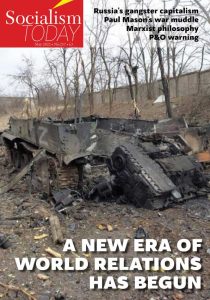
Some events become iconic when they are subsequently seen as a representative summation of a new turning point in social, economic or political developments. The fall of the Berlin Wall is one example. It symbolises the collapse of Stalinism in Russia and Eastern Europe and the end of the Cold War framing of world power relations as that between competing social systems: capitalism in the West, and the non-capitalist Stalinist states of the East.
The rotting of the Stalinist regimes under the internal contradictions of totalitarian rule – the mirror opposite of workers’ democracy – had been an extended process as the bureaucracy moved from being a relative to an absolute fetter on the economy and society. But that did not diminish the significance of the November 1989 drama. And while it too is the product of underlying and ongoing processes, the Russian invasion of Ukraine on February 24 will also come to be seen as another pivotal moment in history.
Already the war, however it finishes, has upset the global architecture of treaty organisations, diplomatic conventions and so on built up over the past 30 years. This international machinery was either remoulded from institutions of the Cold War era (GATT became the World Trade Organisation, for example) or superseded them (the G7 and G20, the International Criminal Court, the COP climate summits). Together they constituted the means by which the conflicting interests of the world’s most powerful capitalist nation states (and the formally ‘non-market economy’ Chinese regime) were mediated in the post-Stalinist world.
Read more